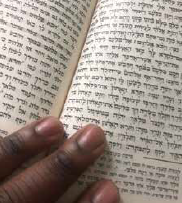Tag : Jews of Color Torah Academy
January 16, 2020 by admin
For Jews of Color, by Jews of Color

I remember a time not long ago in which I could read Hebrew, chant it, recognize words, but not understand the text before me. I remember visiting Orthodox cousins and watching them davening, a flurry of words on their tongues. In contrast, my immediate family could not speak a word of Hebrew and, for a long time, Hebrew remained a mystery language to us. At times growing up it was difficult to feel ownership over my Jewishness. I remember being told as a child that I was not even Jewish by a person who simply looked at my mother, who is Filipina and Jewish, and made an assumption.
Particularly outside of Orthodox spaces, Hebrew and Jewish education in this country are inaccessible at best, and unnecessarily expensive. Hebrew is by no means the best or only Jewish language, but it is one that can grant access to a wealth of Jewish texts and histories spanning time periods and continents. The distinctly American myth that adults cannot learn new languages impedes access to Hebrew courses. The pervasive idea is that if you did not or could not access Hebrew or Jewish education as a child, if you do not have the yichus, the background, as some might say, then you will not be successful. Jews of Color have as many individual experiences as there are Jews of Color in the world, but the JOC community includes many adult learners wanting a Jewish education who are particularly likely to fall through the cracks. When you add pervasive racism, which exists even in the most progressive majority-white Jewish spaces, Jewish learning spaces that do exist can still not be the right place for good learning to occur.
So my friend and colleague Yehudah Webster and I co-founded Ammud, the Jews of Color Torah Academy as a space for Jewish education for Jews of Color by Jews of Color.
ARIELLE KORMAN, “Why She Needed to Create the Jews of Color Torah Academy,” on the Lilith Blog.
- No Comments
 Please wait...
Please wait...